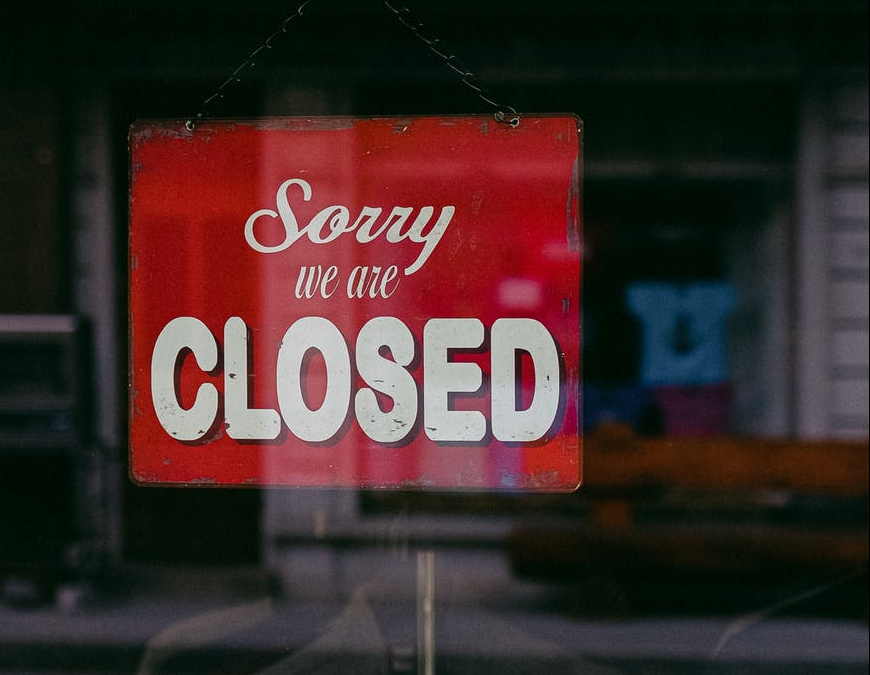A Guest Post from Carla Lopez – BoomerBiz.org – Photo courtesy of Pexels
As a small business owner, it’s more than disheartening when you have to close your doors. Shutting up shop — whether temporarily or permanently — can set you back emotionally and financially. It’s easy to feel stuck when this happens, but it’s important to learn how to keep your momentum going so you can transition to your next idea. our 4 tips for recovering from a small business closure below will help you learn how to cope with closing your doors and discover which steps you can take next.
4 Tips for Recovering from a Small Business Closure
Taking Care of Legal Obligations
If your operation is closing down permanently, the first thing you should do is familiarize yourself with the proper steps for dissolving your business. It’s important to notify your creditors, settle your debts, take care of your taxes, and handle other legal obligations. Keep in mind that the exact steps for dissolving your business are a little different depending on whether you’re incorporated or operating as a sole proprietor.
In any case, skipping your legal obligations can leave you plagued with lawsuits and major credit issues. Not only does this create a stressful situation, but it also hinders your ability to start with a blank slate for your next business idea.
Coping with Your Business Closing
When your business closes, you might feel desperate to dive into another endeavor right away. However, it’s sometimes necessary to pause and take care of yourself first. Given that shutting down your business is often an overwhelmingly emotional experience, you’re unlikely to feel like the best version of yourself in the immediate aftermath.
Being a business owner is stressful enough on its own, but facing failure can wreak havoc on your overall mental health. However, you’re far from alone. According to Inc., the traits that draw business owners and entrepreneurs to their calling can also predispose them to experiencing anxiety, depression, and feelings of despair.
With that in mind, it’s crucial to learn how to create a support network and ask for help when you need it. Remembering the self-care basics like eating well, prioritizing sleep, and talking to loved ones is also a good way to focus on your mental health and recenter yourself.
It’s also a good idea to make physical fitness a part of your routine. Exercise can lower your stress and give your mental health a boost. You can easily work out at home with some dumbbells and resistance bands and then use a smartwatch to track your progress. For example, a device like the Apple Watch SE allows you to customize your metrics.
Exploring New Business Ideas
Fleshing out new business ideas is exciting, but be sure to take your time and carefully explore all of your options. In many ways, seeing your small business close is a good learning opportunity. Along the way, you’ve probably formed a good idea of what works and what you can do better with your next endeavor. Be sure to test your new business idea by using the business model canvas as your guide.
Of course, no matter what kind of business you plan to open, you’ll need to have a plan for covering your bases. Even if you’re a sole proprietor, it often helps to have someone take care of the areas of your business you can’t handle alone. For example, you might not have time to juggle marketing tasks with everything else you have to do, so you may want to hire a full-service marketing strategy, branding, website design and copywriting company like XL Consulting.
Assessing Your Finances
You probably already know how important it is to have your finances in order when you own a small business. Before launching your next idea, it’s wise to take a look at your personal finances. Addressing credit issues, debts, and problem areas in your budget will help you start your next endeavor on the best footing possible.
On the business side of things, you will also want to consider the different ways to fund your next idea. The Small Business Administration explains that there are a variety of ways to secure financing, including loans and investors.
A small business closure can be a huge setback, but there’s always hope for starting a new business idea. Before taking the leap, make sure you wrap up any legal loose ends with your old business and prioritize your mental health so you’re in the best emotional and financial shape possible for your next endeavor.
We hope our 4 tips to recovering from a small business closure is helpful. If you would like to take advantage of our FREE 1/2 hr. complimentary call to see how we can help you with business strategy, connect with us and we will be happy to set up virtual session with you.
If you liked this article, you may like one of these:
How to Brand or Rebrand Your Business
5 Easy Ways to Get Your Business Online
9 Essential, Powerful Tips To Maximize Linkedin For Business

